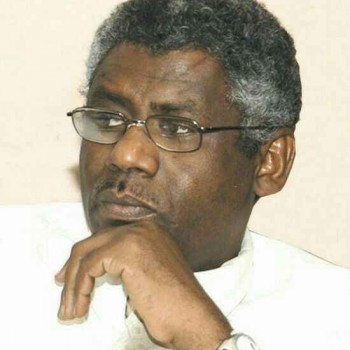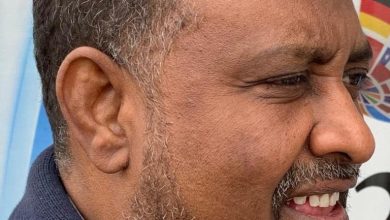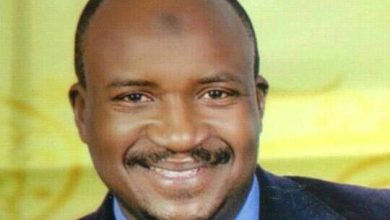Interview with Mubarak Al-Fadil (1/2)

As I See
By: Adel Al-Baz
1
No one can doubt the national stances of Mr. Mubarak Al-Fadil. Since the war of the Janjaweed against Sudan began, he has been one of the most prominent politicians supporting the army, never wavering in situations that required a unified national position. He has consistently argued forcefully in all forums against the rebellious militias and their affiliates. I have followed his efforts with the country’s leaders, advising, meeting, and struggling to repel the invaders. This should be acknowledged before we delve into the core of the discussion with Mr. Mubarak on his recent positions.
2
Since the Cairo Conference, where a sudden disagreement arose between Mr. Mubarak and the armed movements that were allied with him against the rebels, Mr. Mubarak has taken a stance against the armed movements that refused to sign the outcomes of the Cairo Conference. This disagreement escalated into an exchange of attacks between him and the movements. The conflict could have ended there, but unfortunately, it developed into a comprehensive stance against the movements and the significant roles they play in fighting the rebels.
3
The disagreement between Mr. Mubarak and the government also erupted over political assessment and the stance on the Geneva negotiations called for by America. Mr. Mubarak was of the opinion that Sudan should participate in those negotiations in the manner proposed by America. Of course, it is not unusual for political stances to differ among those fighting in the same trench. Therefore, it is necessary to discuss this new stance with Mr. Mubarak with respect. And here we begin.
4
In a tweet yesterday, Mr. Mubarak said, “Egypt and America have canceled the Cairo meeting with the Sudanese delegation on implementing the Jeddah Agreement due to Sudanese officials breaking the protocol agreed upon with Egypt and America regarding the names of the Sudanese military delegation, adding representatives of the armed movements that the international and regional communities refuse to involve in the negotiations and refuse to equate with the Sudanese army.” For the first time, I understand what the American envoy Tom Perillo meant by his remarks about the “canceled protocol.” So, the reason for the failure of the Cairo meeting was the addition of representatives of the armed movements; did the army or the government break the unagreed protocol? All right… but the President of the Sovereign Council stated in a press conference that “the Americans invited the army, but we will send a government delegation.” So the government did not agree to the American proposal that only a military delegation would participate in the Cairo negotiations, to begin with, so how can it be said that the army broke the protocol? This proposed protocol was rejected from the start, unless Mr. Mubarak believes that the American orders must be followed to the letter, allowing them to choose the delegation that suits them. And if the government rejects their proposals, it means violating a protocol imposed by America or even proposed by Egypt!!
5
How can President Al-Burhan, or anyone else, invite the armed movements to fight alongside him, and when the time comes for negotiations and deciding fates, the army is left alone to decide? Does this mean that the armed movements are expected to fight and die and then leave the army with the freedom to negotiate?!! This is not fair, especially since these movements and the sacrifices they made are well known and deserve to be at all negotiation tables, especially since the current war is an existential one for them. Any future compromise concerns them entirely, so how can they fight in the battlefields while others negotiate on their behalf?!! Have some fear of God in them, Mr. Mubarak.
I expected Mr. Mubarak to demand that the army include representatives of the political forces that supported the army, the mobilizers, and the mujahideen, including Mubarak himself, but what happened was the exact opposite. Is this reasonable? And if the bread is baked, it is Jundub who is called to eat it!
6
I was surprised by Mr. Mubarak’s statement when he said that the international and regional community could help implement the Jeddah Agreement.!! Which international and regional community are you talking about, Mr. Mubarak? Isn’t it the same international community that stood by for a year and a half, unable to compel the rebellious militias to implement the Jeddah Declaration they signed? The same declaration witnessed by representatives of the international community. How does Mr. Mubarak think that these same conspirators, who have prevented the condemnation of the rebellion in the Security Council and its financiers, will now help implement that agreement?!! Why didn’t the international community act before, and why is it rushing now, and how can we trust the same international and regional community to compel the rebels to implement that declaration this time? Who is the international community, Mr. Mubarak? Isn’t it the same “Quartet” that insisted on the Framework Agreement, which ignited the war? Isn’t it the same regional community that demanded a no-fly zone and an arms embargo on the Sudanese army? Isn’t it the same community that denied the legitimacy of the Sudanese government from the first days? What international community are you talking about, Mr. Mubarak?
7
The truth is that when the international community realized that the militia’s project to seize Sudan had failed and would fail, it came rushing in now to save what remains of the Al-Daglo militia. This is the correct interpretation, Mr. Mubarak, not because the international community has suddenly developed a (compassion) for the remaining Sudanese people!
We continue…



